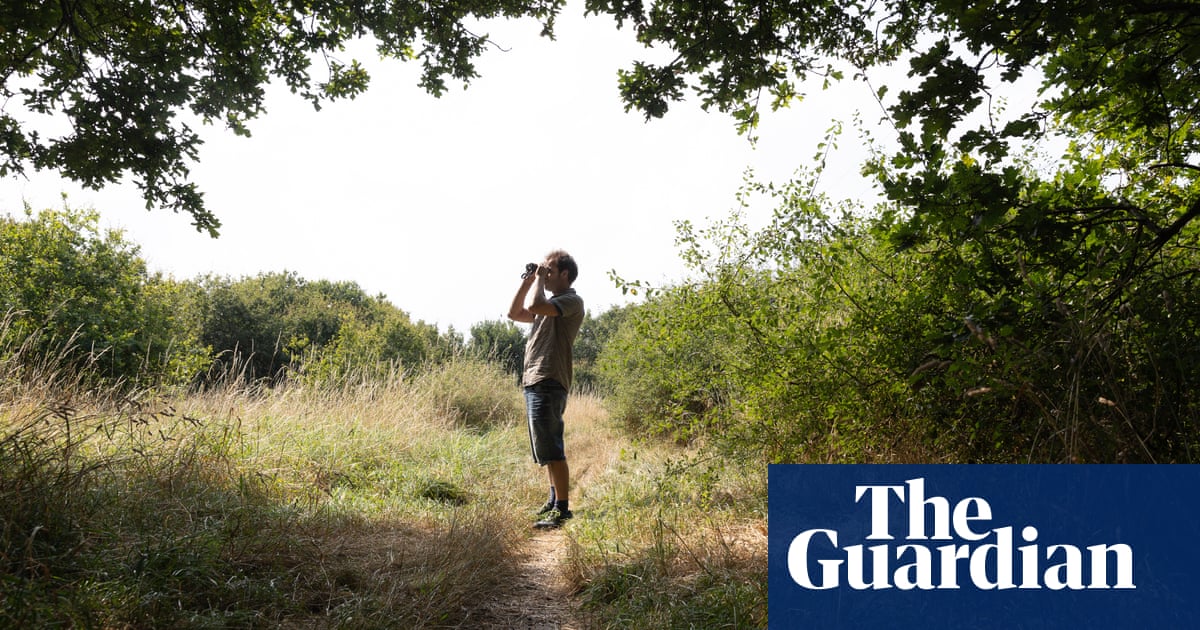A council is proposing to remove the second best place for nightingales in the UK from its local plan for 1,000 new homes, in a win for community campaigners and environmentalists.
Middlewick Ranges, a former Ministry of Defence firing range on the edge of Colchester, is set to be dropped from the city council’s allocated housing sites after councillors took heed of a growing array of ecological evidence highlighting its national importance for nature.
According to experts, Middlewick meets or exceeds the criteria for a site of special scientific interest (SSSI) in six categories – for its endangered nightingales, rare barbastelle bats, range of invertebrates, rare acid grassland, waxcap fungi and veteran trees.
But the 76-hectare (187.8-acre) site has remained unprotected by any SSSI designation, leaving campaigners to fight for eight years to stop the concreting over of its nature-rich meadows and glades, which are popular with local people.
The case comes at a time when Keir Starmer and Rachel Reeves have denigrated newts, bats and toads for supposedly blocking development and there is a push to use mitigation – creating nature-rich habitat elsewhere – to enable new houses, roads and other infrastructure to be built.
Councillors allocated Middlewick 1,000 homes in the local plan before they were aware of a 2017 ecological report that identified large swaths of rare acid grassland on the site. The ranges have been untouched by a plough for at least 200 years and contain more than 10% of Essex’s remaining acid grassland, a particularly biodiverse, plant-rich sward.
Recent surveys have revealed rare invertebrates, barbastelle bats and 21 species of waxcap fungi. The threshold for a site to be designated an SSSI for its waxcap diversity is 19 species.
After an outcry, and allegations that ecological assessments for the MoD had downplayed the natural riches of Middlewick and overstated the potential to recreate acid grassland elsewhere, the council is now being guided by its own report based on “robust ecological evidence” from experts including the government’s conservation watchdog, Natural England. This recommends that Middlewick is excluded from the revised plan for housing in the rapidly growing Essex city.
Andrea Luxford Vaughan, a councillor and the portfolio holder for planning, environment and sustainability, said: “Based on the latest evidence, we believe it is the right decision to separate Middlewick from the local plan. We recognise the depth of community concern about Middlewick and have taken the necessary steps to ensure transparency and accountability throughout this process. We are balancing the need for sustainable development with the responsibility to protect our natural environment.”
The recommendation to remove Middlewick will be voted on by a council committee on 17 February and then subject to a six-week public consultation with local residents and stakeholders.
The 3,500-member Friends of Middlewick group, supported by Essex Wildlife Trust, Buglife, Butterfly Conservation, the RSPB and others, hopes that the former ranges will now be transformed into a community nature reserve for south Colchester.
Martin Pugh, the deputy chair of the Friends of Middlewick, said: “The evidence is overwhelming – protecting Middlewick as a nature reserve is the only logical path forward. It’s a once-in-a-generation opportunity to safeguard this extraordinary place for people and wildlife, now and for future generations.”
after newsletter promotion
Dr Jeremy Dagley, the director of conservation at Essex Wildlife Trust, said: “We warmly welcome the recommendation in this report and urge Colchester councillors to vote in support of their council’s careful, evidence-based approach to reaching this exemplary decision. We hope that work can now begin to ensure that Middlewick Ranges is fully protected for future generations. It is undoubtedly the jewel in the city’s crown and should be showcased as a beautiful, nature-rich green space where wildlife thrives and people are enriched.”
Jamie Robins, a programmes manager at Buglife, said: “Against the background of a nature emergency, with our insects in steep decline, it is more important than ever to celebrate and preserve our best wildlife sites. We hope that this is a first step towards Middlewick Ranges and the special species that call it home being there to enjoy for future generations.”
Justin Tilley, Natural England’s principal manager for West Anglia, said: “Sustainable growth, including building new homes, is vital and so is nature recovery. These two national priorities must be delivered together. That is why we are working closely with stakeholders to secure the best outcomes for people and nature at this important site.
“Decisions on where to progress new housing is ultimately a matter for local authorities. We are confident that Colchester city council’s planning policies can achieve the necessary safeguards and enhancement for the natural environment, including the important wildlife at Middlewick Ranges, alongside providing the homes that people need.”
Tim Young, the chair of Colchester city council’s local plan committee, said: “The evidence before us highlights the site’s unique biodiversity, which has been recognised by local campaigners. This isn’t just about land on a map, it’s about the identity of our city, our commitment to the environment, and the legacy we leave for future generations.”
Article by:Source: Patrick Barkham














